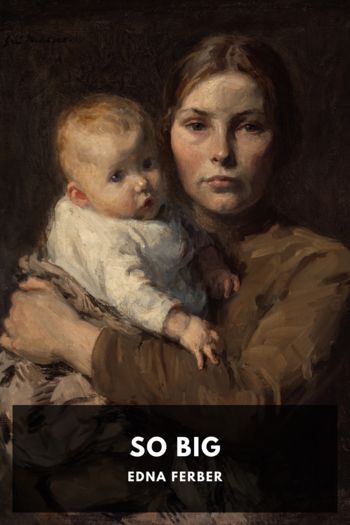So Big, Edna Ferber [best classic novels .txt] 📗

- Author: Edna Ferber
Book online «So Big, Edna Ferber [best classic novels .txt] 📗». Author Edna Ferber
Football, fudge, I-said-to-Jim, I-said-to-Bessie.
The Unclassifieds would no more have deliberately cut a class than they would have thrown their sparse weekly budget-allowance into the gutter. If it had been physically possible they would have attended two classes at once, listened to two lectures, prepared two papers simultaneously. Drab and earnest women between thirty and forty-eight, their hair not an ornament, but something to be pinned up quickly out of the way, their clothes a covering, their shoes not even smartly “sensible,” but just shoes, scuffed, patched, utilitarian. The men were serious, shabby, often spectacled; dandruff on their coat collars; their lined, anxious faces in curious contrast to the fresh, boyish, carefree countenances of the Classifieds. They said, carefully, almost sonorously, “Political Economy. Applied Psychology.” Most of them had worked ten years, fifteen years for this deferred schooling. This one had had to support a mother; that one a family of younger brothers and sisters. This plump woman of thirty-nine, with the jolly kindly face, had had a paralyzed father. Another had known merely poverty, grinding, sordid poverty, with fifteen years of painful penny savings to bring true this gloriously realized dream of a university education. Here was one studying to be a trained Social Service Worker. She had done everything from housework as a servant girl to clerking in a 5- and 10-cent store. She had studied evenings; saved pennies, nickels, dimes, quarters. Other valuable educative experience in practical life. They had had it, God knows.
They regarded the university at first with the love-blind eyes of a bridegroom who looks with the passionate tenderness of possession upon his mistress for whom he has worked and waited through the years of his youth. The university was to bring back that vanished youth—and something more. Wisdom. Knowledge. Power. Understanding. They would have died for it—they almost had, what with privation, self-denial, work.
They came with love clasped close in their two hands, an offertory. “Take me!” they cried. “I come with all I have. Devotion, hope, desire to learn, a promise to be a credit to you. I have had experience, bittersweet experience. I have known the battle. See, here are my scars. I can bring to your classrooms much that is valuable. I ask only for bread—the bread of knowledge.”
And the University gave them a stone.
“Get on to the hat!” said the Classifieds, humorously, crossing the campus. “A fright!”
The professors found them a shade too eager, perhaps; too inquiring; demanding too much. They stayed after class and asked innumerable questions. They bristled with interrogation. They were prone to hold forth in the classroom, “Well, I have found it to be the case in my experience that—”
But the professor preferred to do the lecturing himself. If there was to be any experience related it should come from the teacher’s platform, not the student’s chair. Besides, this sort of thing interfered with the routine; kept you from covering ground fast enough. The period bell rang, and there you were, halfway through the day’s prescribed lesson.
In his first year Dirk made the almost fatal mistake of being rather friendly with one of these Unclassifieds—a female Unclassified. She was in his Pol Econ class and sat next to him. A large, good-humoured, plump girl, about thirty-eight, with a shiny skin which she never powdered and thick hair that exuded a disagreeable odour of oil. She was sympathetic and jolly, but her clothes were a fright, the Classifieds would have told you, and no matter how cold the day there was always a half-moon of stain showing under her armpits. She had a really fine mind, quick, eager, balanced, almost judicial. She knew just which references were valuable, which useless. Just how to go about getting information for next day’s class; for the weekly paper to be prepared. Her name was Schwengauer—Mattie Schwengauer. Terrible!
“Here,” she would say good-naturedly, to Dirk. “You don’t need to read all those. My, no! I’ll tell you. You’ll get exactly what you want by reading pages 256 to 273 in Blaine’s; 549 to 567 in Jaeckel; and the first eleven—no, twelve—pages of Trowbridge’s report. That’ll give you practically everything you need.”
Dirk was grateful. Her notes were always copious, perfect. She never hesitated to let him copy them. They got in the way of walking out of the classroom together, across the campus. She told him something of herself.
“Your people farmers!” Surprised, she looked at his well-cut clothes, his slim, strong, unmarked hands, his smart shoes and cap. “Why, so are mine. Iowa.” She pronounced it Ioway. “I lived on the farm all my life till I was twenty-seven. I always wanted to go away to school, but we never had the money and I couldn’t come to town to earn because I was the oldest, and Ma was sickly after Emma—that’s the youngest—there are nine of us—was born. Ma was anxious I should go and Pa was willing, but it couldn’t be. No fault of





Comments (0)